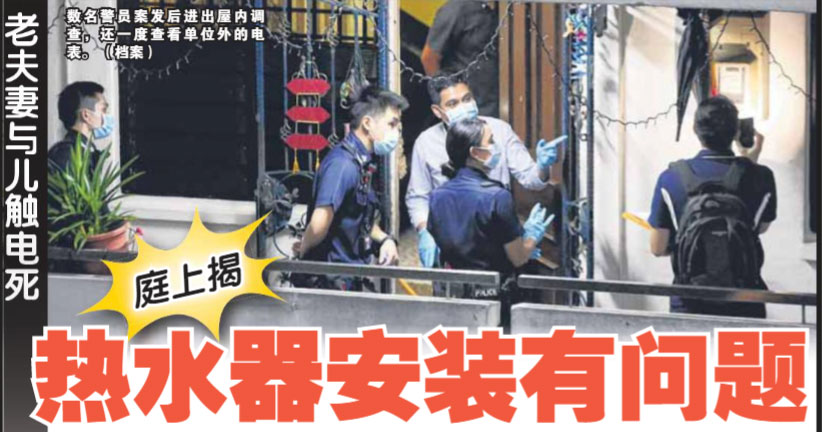Follow us on Telegram for the latest updates: https://t.me/mothershipsg
A coroner’s inquiry on Mar. 9 into the deaths of an elderly couple and their son found that they were electrocuted in a Jurong flat due to the water heater being poorly installed years ago that subsequently saw substantial wear and tear issues.
The main factor was due to the fusing together of the wires in a three-pin plug that powered the instant water heater, sending a live current into the first victim who held on to the showerhead, reported Today.
Electrocuted one by one
On Dec. 10, 2020, 80-year-old Omar Manan had collapsed while taking a shower in his bathroom.
His 66-year-old wife Asmah Bujang was also electrocuted after going into the toilet to help her husband.
Their 45-year-old son, Muhamad Ashikin Omar, and his teenage daughter visited the couple's house to check in on them after realising the elderly grandparents could not be reached by phone.
Breaking into the flat, they found the elderly couple slumped on the floor of the bathroom.
Water was still flowing from the shower head.
Ashikin's daughter saw Ashikin cry out, "Mak!", which is Malay for mother, as he rushed towards his parents.
He then collapsed suddenly after making contact with one of them.
The daughter then tried to shake her father awake thinking he had fainted at the scene.
She then called her mother in a state of shock, who then contacted the Singapore Civil Defence Force, according to CNA.
An autopsy determined the cause of all three deaths was electrocution.
Cables in three-pin plug fused together
Senior associate engineer Goh Chin Fong from the Energy Market Authority (EMA) testified that the elderly couple's water heater was powered by a three-pin plug connected to an extension outlet that was connected to a power socket in the kitchen.
He said when the plug to the water heater was opened after the incident, the cables inside the plug were “badly burnt”.
The wires in the three-pin plug had fused together because they were overloaded.
The three-pin plug had a 13-amp fuse, and the operating current of the water heater was 14.2 amps, reported Today.
Prolonged heating from repeated usage degraded the insulation on the cables over time, and the neutral and earth cables fused together from the heat.
The electric current flowed back to the copper housing of the water heater, and energised the metallic water hose that Omar was holding.
As Omar was barefoot, the current flowed from his hand to the wet ground and electrocuted him.
Water heater should not be connected to a wall plug
Goh said the accident could have been avoided if a double-pole switch with a standalone circuit was used instead of a three-pin wall plug to power a water heater, according to CNA.
Cables in a double-pole switch do not cross or touch each other, which minimises the risk of the cables fusing together in case of overloading.
Double-pole switches should be used for appliances that draw large amounts of electricity, such as ovens and air conditioners, he added.
Newer Housing and Development Board (HDB) flats have them, said Goh, adding that HDB began installing water heater connections with such switches in the late 1980s.
The elderly couple's flat at Block 120 Ho Ching Road had been built in 1971, when there were no instant water heaters.
Their water heater was installed sometime after 2008.
The couple's daughter told investigators that she had no clue who installed it, reported The Straits Times.
Circuit breaker did not protect household's entire circuitry
Goh also noted that the circuitry that the water heater drew on was also not protected by a residual current circuit breaker (RCCB), reported Today.
A RCCB would have tripped and cut off the electricity supply when an earth leakage was detected, but this was not a requirement when the flat was built.
When the flat underwent an upgrading programme in 2003, a RCCB was installed.
However, it only protected circuitry at the utility room and would not have interrupted electricity supply to the water heater, which drew power from the older wiring system built in 1971.
Goh also noted that this was a secondary protective measure, and the main cause of the electrocution was the damaged cables in the three-pin plug.
What homeowners should take note
Goh advised homeowners not to use three-pin plugs or a 13-amp fuses for bathroom appliances like instant water heaters, according to Today.
Instead, they should check their bathroom for connection points meant for water heaters.
If there are no such points, homeowners should engage a licensed electrical worker to install a standalone circuit for the water heater.
After that, homeowners should engage a qualified technician to connect the heater to a connection point.
Homeowners are also recommended to regularly test their RCCB by pressing the test button monthly.
Electricity supply in the home should be completely cut off when the RCCB trips.
Otherwise, they should engage a licensed electrical worker to rectify the problem, Goh said.
State Coroner Adam Nakhoda will deliver his findings on April 29.
Top photo via Shin Min Daily News.
Follow and listen to our podcast here
If you like what you read, follow us on Facebook, Instagram, Twitter and Telegram to get the latest updates.
